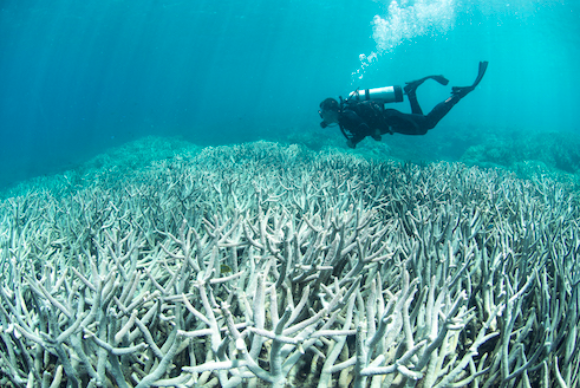Extreme coral bleaching may be new normal by 2034

Large parts of the Great Barrier Reef will have died off by the mid-2030s, according to research examining the role of climate change in this year’s extreme coral bleaching event.
This research confirmed studies that have predicted the decline of coral reefs across the planet by mid-century.
Researchers found climate change had added 1 degree C of warming to the ocean temperatures this March.
But more worryingly still, they reveal that extreme ocean temperatures that led to this year’s bleaching may become the new normal within 20 years if greenhouse gas emissions continue to increase.
“These extreme temperatures will become commonplace by the 2030s putting a great strain on the ecosystems of the Great Barrier Reef,” said lead author Andrew King, from the ARC Centre of Excellence for Climate System Science.
“Our research showed this year’s bleaching event is 175 times more likely today than in a world where humans weren’t emitting greenhouse gases," Dr King said.
"We have loaded the odds against the survival of one of the world’s greatest natural wonders.”
The study has yet to be peer-reviewed, although the methods used to derive the role of climate change in extreme events are well established in the climate science community.
They have been used repeatedly and successfully to determine the role of human caused climate change in other extreme temperature events.
The researchers were prompted to take the unusual approach of releasing the results before publication because of the grave nature of their findings and importance of the Great Barrier Reef to all Australians.
“We are confident in the results because these kind of attribution studies are well established but what we found demands urgent action if we are to preserve the reef,” Dr King said.
“For this reason, we felt it was vital to get our findings out as quickly as possible.”
Professor Ove Hoegh-Guldberg, from the Global Change Institute at the University of Queensland, used different methods to predict a similar outcome for the Reef in a paper he published in 1999. He predicted the loss of coral dominated reefs on the Great Barrier Reef by 2040.
“The current bleaching event and this attribution study leads me to believe that my highly controversial predictions in 1999 were actually conservative,” he said. “Being right - in this case - is hardly cause for celebration.”
The future of coral dominated reef systems like the Great Barrier Reef is now in serious doubt.
“Reefs need time around 15 years to completely recover from a coral bleaching event of this magnitude,” Professor Hoegh-Guldberg said.
“Recovery rates are being overwhelmed by more frequent and severe mass coral bleaching.”
If the conditions forecast by this research come to pass, we are likely to lose large parts of the Great Barrier Reef in just a couple of decades, with the possibility that some of the most pristine northern areas will be the first to disappear.
Losing the corals of the Great Barrier Reef represents a serious risk for thousands of species, as well as reef related tourism and fishing industries that are worth $5-6 billion each year and which employ 69 000 people.
Five researchers across three institutions conducted the study. They were:
- Dr Andrew King, ARC Centre of Excellence for Climate System Science, School of Earth Sciences, University of Melbourne.
- Prof David Karoly, ARC Centre of Excellence for Climate System Science, School of Earth Sciences, University of Melbourne.
- Mitchell Black, ARC Centre of Excellence for Climate System Science, School of Earth Sciences, University of Melbourne
- Prof Ove Hoegh-Guldberg, The Global Change Institute, University of Queensland.
- Dr Sarah Perkins-Kirkpatrick, ARC Centre of Excellence for Climate System Science, Climate Change Research Centre, University of NSW